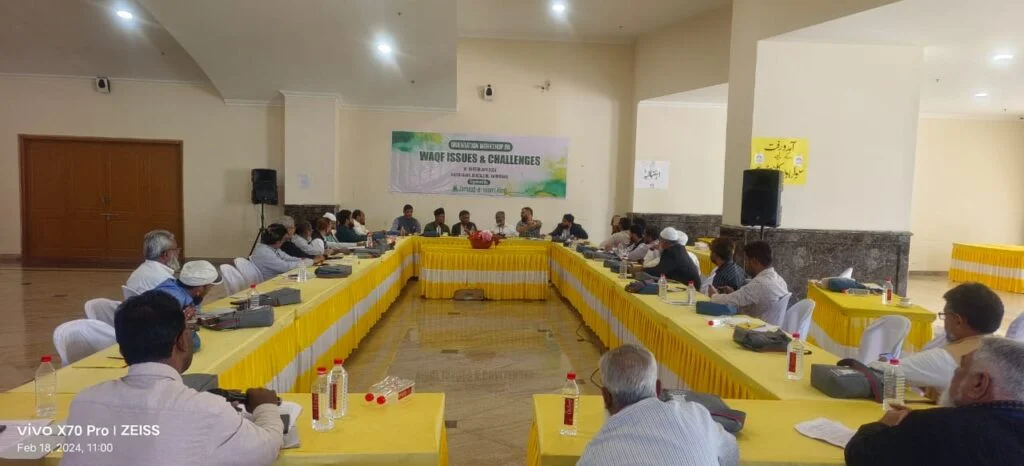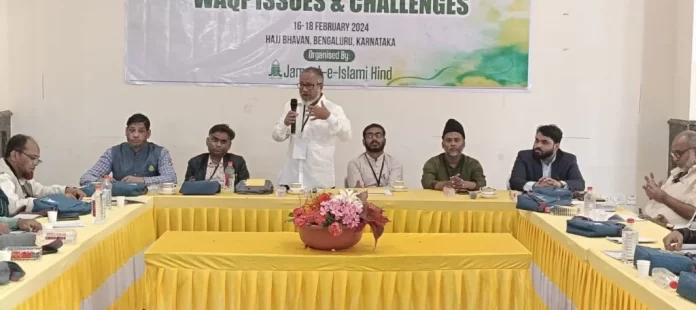Bengaluru, Feb. 23: Jamaat-e-Islami Hind (JIH) organized a three-day workshop here recently to address the critical issues and challenges facing Waqf, Islamic endowments vital to the Muslim community’s social and economic well-being.
The workshop brought together specialists, officials, activists, and representatives from across the country, fostering a collaborative discussion on safeguarding these valuable assets. The workshop’s inclusivity, involving a range of experts and community representatives, reflects the complexity of challenges surrounding Waqf protection and management in the country.
In his online speech, JIH President Syed Sadatullah Husaini raised alarm over the growing threats facing Waqf properties. Highlighting the ongoing struggles against land grabbers, corruption, and political interference, he warned of a “new aspect” – the emergence of “pro-communal political forces” aiming to abolish the Waqf Act and demolish historical mosques.
During the address, the JIH leader underscored the urgency for the Muslim community to unite in safeguarding Waqf properties. He called on individuals and organisations to raise awareness about the significance of these properties, extend support to groups actively working to protect them, and take legal measures against those attempting encroachment.
Expressing his concern over the difficulties faced by those involved in Waqf preservation efforts, Mr. Husaini acknowledged the persistent threats from land grabbers, the land mafia, and corrupt politicians who exploit these properties for personal gain.
Highlighting the rising challenges in the present situation, the JIH chief discussed the emergence of a strong ideological aspect to the political challenge, with pro-communal political forces obstructing the work of those dedicated to Waqf preservation. He pointed out instances of proposed legislative changes, including a Private Members’ Bill in the Rajya Sabha, raising concerns about potential amendments to the existing Waqf Act.
Mr. Husaini shed light on the multifaceted challenge, citing the threat to mosques, some dating back centuries, and instances of calls for their overnight demolition. He also mentioned the ongoing campaign of misinformation across the country including launching a film aimed at creating misunderstanding against Waqf, with numerous petitions being heard in various courts.
Addressing the diverse challenges, the JIH chief emphasized the need for vigilance and heightened awareness among common Muslims regarding the importance of Waqf. He urged for a comprehensive understanding of the historical and cultural significance of Waqf properties in India and emphasized their potential for contributing to the development and progress of the Muslim community and the nation as a whole.
Underscoring the significance of public involvement in addressing issues related to Islamic endowments, JIH Vice President Malik Motasim Khan called on Muslims to actively engage in protecting Awqaf (religious endowments) nationwide. During his speech, he pinpointed three crucial areas where increased awareness and participation could have a substantial impact: government or administration, state waqf boards, and waqf management committees. Drawing attention to the various threats facing Waqf properties, such as potential mishandling by government bodies, state Waqf boards, and individual trustees, he emphasized the necessity of educating the Muslim public about the importance, proper utilization, and preservation methods of waqf assets.
Speaking on inclusive participation in Waqf protection, JIH Secretary General T. Arif Ali underscored the importance of maintaining close relationships with diverse segments of society, including different schools of thought, media personnel, lawyers, scholars, Ulema, intellectuals, experts, activists, and organizations dedicated to Waqf.
“Maintaining strong ties with these varied stakeholders is crucial for ensuring the effective protection and management of Waqf properties,” Mr. Arif Ali stated. He envisioned a collaborative effort where diverse perspectives and expertise could contribute to the well-being of these religious assets.
To address the challenges faced by Waqf properties nationwide, JIH Secretary Abdul Rafiq stressed the significance of establishing a strong network involving a wide range of community members and organizations dedicated to Waqf, regardless of any internal disagreements.
Stressing the importance of united efforts, he emphasized, “This network should encompass everyone, not just individuals or isolated groups. We require the involvement of retired officers, lawyers, police personnel, Waqf board staff, retired IAS and IPS officers, and various experts. Such extensive collaboration is crucial for our success in this initiative.” Shedding light on the workshop’s goals and objectives, Mr. Rafiq highlighted that the three-day event aims to unite individuals from diverse backgrounds to collectively work towards the improvement and effective management of Waqf properties entrusted to us by our predecessors. He urged all participants to not only take the issue of Waqf seriously but also to sustain their dedication beyond the workshop by collectively fostering a positive and beneficial movement across the nation.
 In a comprehensive overview of Waqf management and administration, JIH Assistant Secretary Inamur Rahman Khan explained key terminologies, departmental structures, and relevant legal frameworks related to Islamic endowments. His presentation addressed the roles and responsibilities of the Central Waqf Council, state waqf boards, and WAMSI. The Waqf Assets Management System of India (WAMSI) is an online portal developed by the Union government to maintain online records of Waqf properties across the country.
In a comprehensive overview of Waqf management and administration, JIH Assistant Secretary Inamur Rahman Khan explained key terminologies, departmental structures, and relevant legal frameworks related to Islamic endowments. His presentation addressed the roles and responsibilities of the Central Waqf Council, state waqf boards, and WAMSI. The Waqf Assets Management System of India (WAMSI) is an online portal developed by the Union government to maintain online records of Waqf properties across the country.
Drawing on the Waqf Act, Mr. Inamur Rehman outlined the mandatory formation, composition, functions, and rights of management committees for each waqf property. He defined key terms like Waqf nama (deed), mansha (purpose), and waqif (donor) while exploring different types of waqf endowments. Through this explanation, the JIH official sought to empower communities and promote informed participation in Waqf management, while identifying key players crucial for safeguarding these valuable religious assets.
In his keynote address, JIH Karnataka President Dr Saad Belgami highlighted the worrying condition of waqf assets across the country, criticizing the lack of seriousness from the community in managing and protecting these religious endowments.
The former CEO of the Karnataka State Waqf Board, Mujeebullah Zafari, spoke about the present situation of the awqaf in the state while present CEO Jilani Mokashi outlined recent schemes and actions by the state government to survey, and digitize records of waqf properties across Karnataka.
Waqf expert Afzalulhaq also spoke at the event about various acts and laws related to the administration of awqaf.




